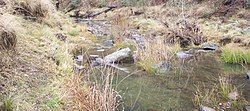Booroolong frog
The booroolong frog (Litoria booroolongensis) is a tree frog from Australia.[3] It lives in New South Wales and Victoria.[4][1]
| Booroolong frog | |
|---|---|

| |
| Conservation status | |
| Scientific classification | |
| Kingdom: | Animalia |
| Phylum: | Chordata |
| Class: | Amphibia |
| Order: | Anura |
| Family: | Pelodryadidae |
| Genus: | Litoria |
| Species: | L. booroolongensis
|
| Binomial name | |
| Litoria booroolongensis (Tyler, 1971)
| |

| |
| Current distribution of the Booroolong frog (in black) compared to the historic distribution (in grey). | |
| Synonyms[2] | |
| |
Adult frogs are about 5 cm long. They can be brown or gray or green, with black marks. Their bellies are white. [3]
They live in or near streams 200 to 1000 meters above sea level.[4] They lay eggs in cracks in underwater rocks. The tadpoles grow in pools or slow-flowing streams.[3]
As of the early 2000s, the booroolong frog was endangered because human beings divided their habitat into small pieces for logging and grazing, because willow trees clogged the streams where they live, and because invasive species of fish ate the tadpoles.[4]
Booroolong Frog Media
Rocky, westerly flowing streams, like this one near Oberon, are prime habitat of the Booroolong frog.
References
- ↑ 1.0 1.1 Lua error in Module:Citation/CS1/Identifiers at line 630: attempt to index field 'known_free_doi_registrants_t' (a nil value).
- ↑ "Ranoidea booroolongensis (Moore, 1961)". American Museum of Natural History. Retrieved August 23, 2020.
- ↑ 3.0 3.1 3.2 "Booroolong Frog - profile". New South Wales Office of Environment and Heritage. December 1, 2017. Retrieved June 15, 2020.
- ↑ 4.0 4.1 4.2 J-M Hero; G. Gillespie; F. Lemckert; P. Robertson; M. L (April 5, 2004). "Litoria booroolongensis". Amphibiaweb. Retrieved June 14, 2020.


